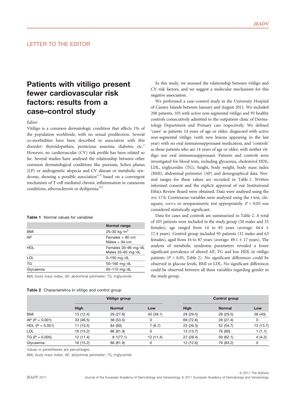Patients With Vitiligo Present Fewer Cardiovascular Risk Factors: Results From a Case-Control Study
December 2011
in “
Journal of the European Academy of Dermatology and Venereology
”

TLDR People with vitiligo may have a lower risk of heart disease.
In a case-control study conducted at the University Hospital of Canary Islands between January and August 2011, researchers found that patients with active non-segmental vitiligo (105 patients) presented a lower cardiovascular (CV) risk profile compared to healthy controls (95 patients). The study assessed blood tests, body measurements, and demographic data, and found that vitiligo patients had significantly lower abdominal perimeter (AP), triglycerides (TG), and higher high-density lipoprotein (HDL) levels, which are indicative of a better lipid profile and thus fewer CV risks. No significant differences were observed in glucose levels, body mass index (BMI), or low-density lipoprotein (LDL) between the two groups. The study suggests an enzymatic basis for this negative association between vitiligo and CV risk factors, as increased levels of antioxidant enzymes like superoxide dismutase and glutathione peroxidase have been found in vitiligo patients, which may contribute to their lower CV risk.




